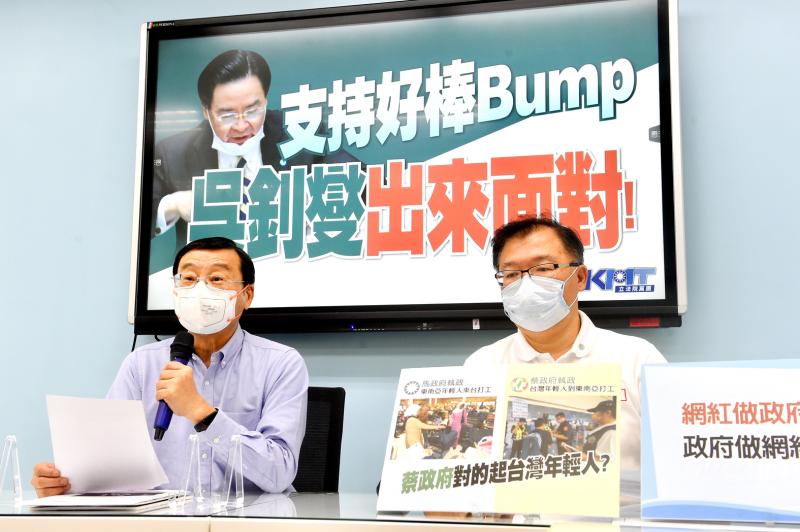Minister of Foreign Affairs Joseph Wu (吳釗燮) should not cite “the legacy of China’s Belt and Road Initiative” as a cause for human trafficking job scams in Cambodia, the Chinese Nationalist Party (KMT) caucus said yesterday, urging the government to propose measures to help Taiwanese victims of overseas deception.
The KMT caucus also called on the Ministry of Foreign Affairs (MOFA) to support Youtuber Hao-pang Bump (好棒Bump) in his efforts to rescue Taiwanese victims.
Hao-pang Bump in March said in a video that the Taipei Commercial Office in Dubai refused to help a Taiwanese surnamed Lin (林) who went to work for a Chinese gambling company and ended up in an illegal job in Dubai.

Photo: George Tsorng, Taipei Times
More recently, he shared videos showing him helping rescue Taiwanese in Cambodia.
The ministry issued a statement on Tuesday saying that the office assisted Lin upon receiving the report that he was trapped in Dubai, and asked the Youtuber not to “spread rumors to mislead Taiwanese.”
However, the ministry thanked Hao-pang Bump for his efforts two days later.
KMT caucus whip William Tseng (曾銘宗) at a news conference yesterday said the ministry was “arrogant and overbearing,” and “bullied” the Youtuber after he contributed to the country.
Tseng thanked Hao-pang Bump for helping to save Taiwanese and promised that his caucus would make efforts to return more defrauded citizens.
Wu calling trafficking incidents “the legacy of China’s Belt and Road Initiative” was “trash talk,” Tseng said, adding that he should propose measures to rescue Taiwanese who become trapped overseas by job scams.
KMT caucus deputy secretary-general Lee De-wei (李德維) criticized Wu for attacking the Youtuber, and called on the government to thoroughly investigate the allegation regarding Lin and keep track of how many Taiwanese go missing overseas.
KMT Legislator Cheng Cheng-chien (鄭正鈐), who returned from Cambodia on Thursday seeking to free Taiwanese held against their will, said via videoconference that the ministry steered responsibility away from the government by “blaming the victims and the rescuers.”
KMT Legislator Hung Meng-kai (洪孟楷), a member of Cheng’s delegation, said there are not enough Taiwanese diplomatic personnel in Cambodia, and the director of the Taipei Economic and Cultural Office in Ho Chi Minh City, which concurrently heads Cambodian affairs, just took office last month.
The ministry should send envoys to Cambodia, he said.
The government is working to assist with the return of hundreds of Taiwanese allegedly being held by human traffickers in Cambodia, the ministry said.
Exercising consular jurisdiction overseas is “a job the Taiwan government will never outsource to another country,” the ministry said after the Chinese embassy in Cambodia offered to help free Taiwanese victims.
The situation has been complicated by Cambodia being a close ally of China. Phnom Penh does not recognize Taiwan or engage in any official contact with Taipei.
Additional reporting by Lu Yi-hsuan and CNA

CHANGING LANDSCAPE: Many of the part-time programs for educators were no longer needed, as many teachers obtain a graduate degree before joining the workforce, experts said Taiwanese universities this year canceled 86 programs, Ministry of Education data showed, with educators attributing the closures to the nation’s low birthrate as well as shifting trends. Fifty-three of the shuttered programs were part-time postgraduate degree programs, about 62 percent of the total, the most in the past five years, the data showed. National Taiwan Normal University (NTNU) discontinued the most part-time master’s programs, at 16: chemistry, life science, earth science, physics, fine arts, music, special education, health promotion and health education, educational psychology and counseling, education, design, Chinese as a second language, library and information sciences, mechatronics engineering, history, physical education

The Chinese military has boosted its capability to fight at a high tempo using the element of surprise and new technology, the Ministry of National Defense said in the Quadrennial Defense Review (QDR) published on Monday last week. The ministry highlighted Chinese People’s Liberation Army (PLA) developments showing significant changes in Beijing’s strategy for war on Taiwan. The PLA has made significant headway in building capabilities for all-weather, multi-domain intelligence, surveillance, operational control and a joint air-sea blockade against Taiwan’s lines of communication, it said. The PLA has also improved its capabilities in direct amphibious assault operations aimed at seizing strategically important beaches,

‘MALIGN PURPOSE’: Governments around the world conduct espionage operations, but China’s is different, as its ultimate goal is annexation, a think tank head said Taiwan is facing a growing existential threat from its own people spying for China, experts said, as the government seeks to toughen measures to stop Beijing’s infiltration efforts and deter Taiwanese turncoats. While Beijing and Taipei have been spying on each other for years, experts said that espionage posed a bigger threat to Taiwan due to the risk of a Chinese attack. Taiwan’s intelligence agency said China used “diverse channels and tactics” to infiltrate the nation’s military, government agencies and pro-China organizations. The main targets were retired and active members of the military, persuaded by money, blackmail or pro-China ideology to steal

DEADLOCK: As the commission is unable to forum a quorum to review license renewal applications, the channel operators are not at fault and can air past their license date The National Communications Commission (NCC) yesterday said that the Public Television Service (PTS) and 36 other television and radio broadcasters could continue airing, despite the commission’s inability to meet a quorum to review their license renewal applications. The licenses of PTS and the other channels are set to expire between this month and June. The National Communications Commission Organization Act (國家通訊傳播委員會組織法) stipulates that the commission must meet the mandated quorum of four to hold a valid meeting. The seven-member commission currently has only three commissioners. “We have informed the channel operators of the progress we have made in reviewing their license renewal applications, and